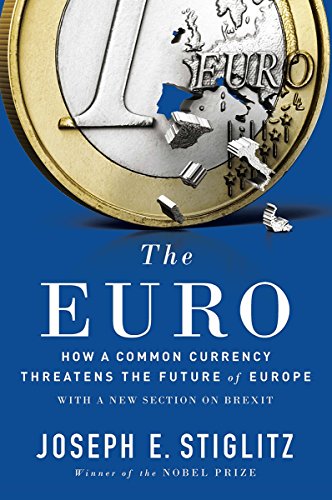The Euro
The timing couldn't be better for this new book, which recounts the tragic irony of how the euro, which was supposed to bring Europe together, is in fact driving it apart. W.W. Norton & Co.
W.W. Norton & Co.
“The Euro: How a Common Currency Threatens the Future of Europe” A book by Joseph E. Stiglitz To see long excerpts from “The Euro” at Google Books, click here.
The timing couldn’t be better for Joseph Stiglitz’s new book, “The Euro.” In it, Stiglitz recounts the tragic irony of how the euro, which was supposed to bring Europe together, is in fact driving it apart, or as he writes: “Economies that were supposed to converge have instead diverged.” When Britain’s decision to leave the European Union shook global financial markets recently, we were all reminded that what happens in Europe affects the entire world.
Stiglitz — who calls the eurozone “a beautiful edifice erected on weak foundations” — writes that “the cracks were clear from the beginning, but after the 2008 crisis, those cracks became fissures.” He notes the huge costs, including rampant unemployment and economic stress, of the austerity measures that have been deployed by the EU, the European Central Bank and the International Monetary Fund (known colloquially as the Troika) purportedly to fix so-called crisis countries such as Greece, Ireland and Spain, whose economies were thrown into disarray after 2008. The resulting battle between creditor nations like Germany and debtor nations like Greece is creating “poorer growth and more divisiveness” than there would have been without any euro at all, argues Stiglitz, whose cogent conclusion is that “the European project is too important to be sacrificed on the cross of the euro.”
Early in the book, Stiglitz writes that he made a decision not to recount the birth of the euro, which is a shame, because this story is crying out for narrative, characters and nuance. Instead, Stiglitz has written a polemic, one that reads like a series of loosely stitched-together lectures. At the root of the book is his deep contempt for what he calls “neoliberal” principles, or “market fundamentalism” — in essence, the belief that free-market policies will solve economic and social issues — which he says has been “discredited” and “flies in the face of a huge body of economic research showing that there is a need for a wider role for government.” The austerity measures undertaken by the Troika are based on this antiquated belief system, in his view.
He might be right, but one downside of his strident style is that the book won’t convince those who want apparently contradictory evidence wrestled to the ground. For instance, in Stiglitz’s telling, the strategy followed by Paul Volcker, the former chairman of the Federal Reserve, who tackled high inflation in the United States, was wrongheaded, end of story. (There are a lot of odd vignettes that don’t seem to have much to do with the euro.) Although Germany, which has embraced market-driven policies more so than other European countries, appears to be doing better than its peers, he dismisses it as a “failure” and complains that its success is coming at the expense of others. He mentions in passing that Ireland, which was forced through a tough austerity program, has returned to pre-crisis levels of gross domestic product. In his view, that’s also a total failure because the social costs were so high. But he simply dismisses the apparent ambiguities instead of addressing them.
Another downside to his style is that it strips the humanity out of the story. He dubs the Troika “abusive” and writes that it “has forced the tearing up of the social contract, the bonds which existed among members of society.” He likens Germany to a “medieval bloodletter.” But his viciousness is oddly bloodless: He doesn’t name names, leaving his villains as faceless institutions. And if the villains are just stupid, bad people who don’t understand economics and want to exploit others, then there’s no opportunity to explore why they might think the way they do, even if their way of thinking is wrong. For instance, Stiglitz calls Germany’s insistence on fiscal discipline and fear of inflation “pure ideology,” which seems to ignore a rather large historical issue (anyone remember the Weimar Republic?) that may play a role in why Germany feels the way it does.The casting of his book — which is that of a very simple morality play, in which Germany and the Troika are evil villains, and the crisis countries, in particular Greece, are innocent victims — also creates some jarring internal contradictions. Stiglitz, who is a big believer in government spending, says the idea that it can lead to a crisis is wrong, but even he has to acknowledge that in Greece, it was precisely government spending that led to the crisis. He doesn’t reconcile this, perhaps because simple morality allows for no nuance, and so it cannot be that while austerity might be bad, maybe Greece also had some issues. (The book is sprinkled with random little paeans to various Greek officials, which might be designed to further the view of the Greeks as noble victims.)
The casting also leads to absurdities. He writes that the creation of the euro resulted in money rushing before 2008 into what became the crisis countries, much in the way it rushed into subprime mortgages. But then, Stiglitz argues that because the growth in some of the crisis countries prior to 2008 was stronger than that of the average for Europe as a whole, “structural problems thus cannot be (and are not) the cause of the crisis,” and so “structural reforms within the individual countries cannot and will not be the cure.” This seems analogous to arguing that because the banking system was declaring record profits before 2008, it didn’t need any structural reform, either.
In broad terms, Stiglitz’s prescription is compelling, although there might be some argument about the details. He writes, “The halfway house in which Europe finds itself is unsustainable: there either has to be ‘more Europe’ or ‘less’: there has to be either more economic and political integration or a dissolution of the Eurozone in its current form.” By “more Europe,” he means shared debt in the form of eurobonds, common deposit insurance for all banks in the eurozone, and more government, from political control of central banks to an EU-wide tax of 15 percent on all incomes above a certain level to perhaps a government-based system of distributing credit that would do away with a private banking sector. He writes, “Reforms of the structure of the Eurozone itself should aim at an economic system that can simultaneously achieve full unemployment and robust growth in each of the member countries.”
Which, especially for someone who claims that he is not “Pollyannaish about experts,” sounds an awful lot like Pollyanna.
Bethany McLean is a financial investigative journalist and a contributing editor at Vanity Fair.
©2016, Washington Post Book World Service/Washington Post Writers Group
Your support matters…Independent journalism is under threat and overshadowed by heavily funded mainstream media.
You can help level the playing field. Become a member.
Your tax-deductible contribution keeps us digging beneath the headlines to give you thought-provoking, investigative reporting and analysis that unearths what's really happening- without compromise.
Give today to support our courageous, independent journalists.







You need to be a supporter to comment.
There are currently no responses to this article.
Be the first to respond.